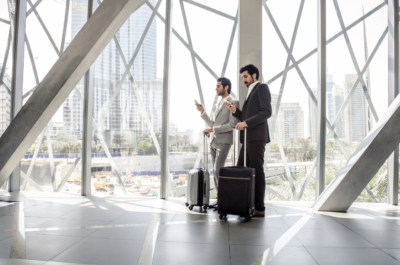In European restaurants, a 5% to 10% tip, in cash is best, when there is no service included. Give porters 1 to 2 euros per bag and the same per day for housekeeping staff. You don’t need to tip in taxis, but you can round up the fare.
When it comes to tipping on holiday, we can be a little cautious with our cash. Just 12% of UK travellers would use some of their unspent currency to tip hotel staff at the end of their holiday according to a survey* by travel money provider ICE – International Currency Exchange. In response, ICE offers tips on tipping etiquette worldwide.
“Tipping etiquette varies from country to country” says Koko Sarkari, COO of ICE. “It really pays to do your research so that you can budget accordingly and tip appropriately. For example, in some parts of the USA and Canada tips can be in the region of 20%. That’s £200 out of a budget of £1,000, making it a serious expense. This might include a $2-$5 tip per day for the housekeeper or room maid.”
“In contrast, whilst tipping is considered rude in Japan and China, in Hong Kong a 10% tip is more common. In Europe tipping is pretty relaxed, usually in the region of 5%-10%, but use cash to ensure it actually goes to your waiter or waitress. These little differences can cause confusion, so it’s best to check before you leave and ensure you have low denomination notes in the local currency for when you first arrive. This can be requested from ICE when ordering Euros or US Dollars.”
Europe
In restaurants, a 5% to 10% tip, in cash is best, when there is no service included. Give porters €1 to €2 per bag and the same per day for housekeeping staff. You don’t need to tip in taxis, but you can round up the fare.
Canada and USA
There is no service charge in North America, so a 15% to 20% tip is expected. In hotels, porters expect $1 to $2 per bag and housekeepers get $2 to $5, depending on the standard of the hotel. Add a 10% to 15% tip to your taxi bills.
South America
The standard tip, in South America, is 10% in restaurants, if service isn’t already included. Taxi drivers don’t generally get a tip, but hotel porters expect around $1 per bag, whilst housekeepers get $2 per day.
Southeast Asia
In Japan and China tipping is a no-no, so there is never any need to do it. In Hong Kong service is already added at top end hotels at 10% to 20%, but if not you can tip porters 10 yuan. Apart from Japan and China, the rest of Asia is happy for you to round up taxi fares.
Australia and New Zealand
They may be on the same side of the world, but their tipping culture is quite different. Tipping is not expected in restaurants in New Zealand, but in Australia a 10% tip is expected in good restaurants. Whilst you don’t need to tip a taxi driver in Australia, in New Zealand people generally add 10% to their bill. In hotels, porters get $1 to $2 per bag and housekeepers get $1 to $5 per day.
Middle East
In restaurants, expect a service charge to be added, but if not, then just the standard 10% is acceptable. When it comes to hotel porters, £1 to £2 per bag is about right and £1 to £2 per day for housekeepers. However, tipping is not expected in taxis.
Africa
If there is no service charge added, a 5% to 10% tip is a good amount or 5% in South Africa. In hotels, it’s a good idea to tip the concierge on arrival to get added services, such as arranging excursions. Porters only require £1 per bag and taxi drivers should get 10% on top of the final bill.
Koko Sarkari concludes: “A bit of homework on tipping etiquette and planning both in terms of ordering travel money and methods of payment overseas can help make budgeting easier.”
*Survey of 1,000 people who have holidayed abroad, conducted June 2014.
Vicky is the co-founder of TravelDailyNews Media Network where she is the Editor-in Chief. She is also responsible for the daily operation and the financial policy. She holds a Bachelor's degree in Tourism Business Administration from the Technical University of Athens and a Master in Business Administration (MBA) from the University of Wales.
She has many years of both academic and industrial experience within the travel industry. She has written/edited numerous articles in various tourism magazines.





























































































































































































































